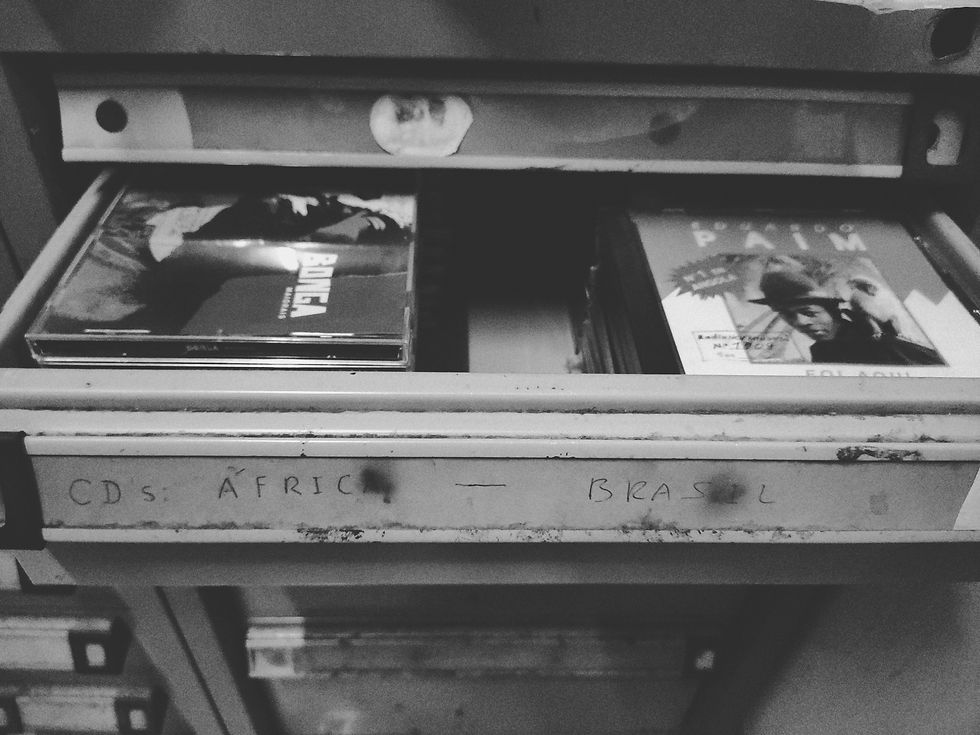"Any file has something of flux, fissure and breakage, opening and separation,
as well as the inherent ability to produce a mirror device,
a reality-generating hallucination." Achille Mbembe
Arquivo Atlântico is an artistic research project by Beatriz Cantinho and Túlio Rosa that proposes to think about coloniality through the creation of an archive: a set of texts, images and gestures that have the potential to inform and problematize the present. The project emerged from a desire to look at the history of the various territories bathed by the Atlantic Ocean in order to understand the forms of occupation, extraction, hierarchization, exclusion and extermination that still mark the relationship between the 'North' and the 'South'. Through multiple forms of engagement with different materials, we propose to approach the archive not only as evidence of a past in the service of a certain historicity, but as a generative matter. Working with a wide range of sources – films, official documents, literature, sound recordings, oral narratives – we have been exploring how creative and compositional practices can rescue the affective capacity of these materials and allow us to deconstruct narratives and visualities that characterize an imaginary of colonial matrix. More than about history, Arquivo Atlântico is an investigation on the notion of memory, on the possibility of re-membering places, peoples and knowledges in different ways. It is an attempt to weave personal stories with historical accounts and understand how, by positioning ourselves in relation to these narratives, we can draw connections, inaugurate dialogues, foster imaginaries and open space for other readings of the present.

Campo de Concentração do Tarrafal

Visita RTCV e entrevista com Francisco Sequeira

Campo de Concentração do Tarrafal, Ilha de Santiago

Campo de Concentração do Tarrafal
Research Trajectory
One of the pillars of Arquivo Atlântico has been the research residencies through which we propose to deepen our research in territories that are central to the critical and aesthetic elaboration we propose to develop through the project.
The first residency, held at OSSO Coletivo in 2020, allowed us to to develop an initial approach to the project, focusing mainly on the interrelationship between our positions, experiences and memories in relation to the discussions that we propose to make through the project, namely a critical approach to the memory of the historical experience of colonialism, and to coloniality as continuation of these dynamics in contemporary social and political formations. As a result of this first research period, we created two audio pieces that were part of Eira#3, a radio platform and public program developed by OSSO, and configured the basis of the work we developed later on through the Arquivo Atlântico Podcast.
In 2021 and 2022, we carried out two other residencies in Cape Verde and the Azores Islands, territories that were central to the Portuguese colonial project and allowed us to observe not only the impacts of the imposition of this system onto the local communities but specially the ways in which these communities have been resisting to such system. Both residencies configured moments of research and analysis in regional historical archives, of contact and dialogue with local communities and, above all, moments of listening and attention to life experience in these places.
The materials resulting from this process have not only informed our approach, but constitute the materiality of our artistic and curatorial practice. The interviews we carried out in these contexts, for example, are part of the sound materials we used in the installation of the project, and the work of the artists we came to know more deeply, especially in Cape Verde, formed part of the film exhibition programs we curated throughout 2021.
Choreographyc Research | ABATE
The choreographic research was developed throughout 2022 in residencies at Espaço do Tempo, in Montemor-o-Novo, Mala Voadora, in Oporto, and at Cartaxo, as part of the regular program of Materiais Diversos. Departing from aesthetic explorations developed in the context of Arquivo Atlântico, ABATE is a choreographic exercise that explores the sound and visual traces of colonial violence, and proposes a movement of inclination and attention to the practices of domination and resistance that constitute the legacy of that period. It is a hybrid object that evokes both the archival material resulting from our investigation and the affections that emerged along our trajectory.
Abate premiered on October 29, 2022, at Galeria José Tagarro, in Cartaxo.
Arquivo Atlântico is part of a historical moment in which extractive and neo-colonial practices, as well as their link with social, racial and gender dynamics, have been guiding discussions around the world. In this sense, the project is allied to a set of initiatives that propose to revisit historical processes and re-elaborate collective memory though artistic practices. The project also marks a moment of exploration and consolidation of the theoretical and methodological approach that we have been developing, and proposes to investigate a set of relationships that allow us to map the present and ask questions for the future, contributing to the production of politically informed practices in the field of performing arts.


